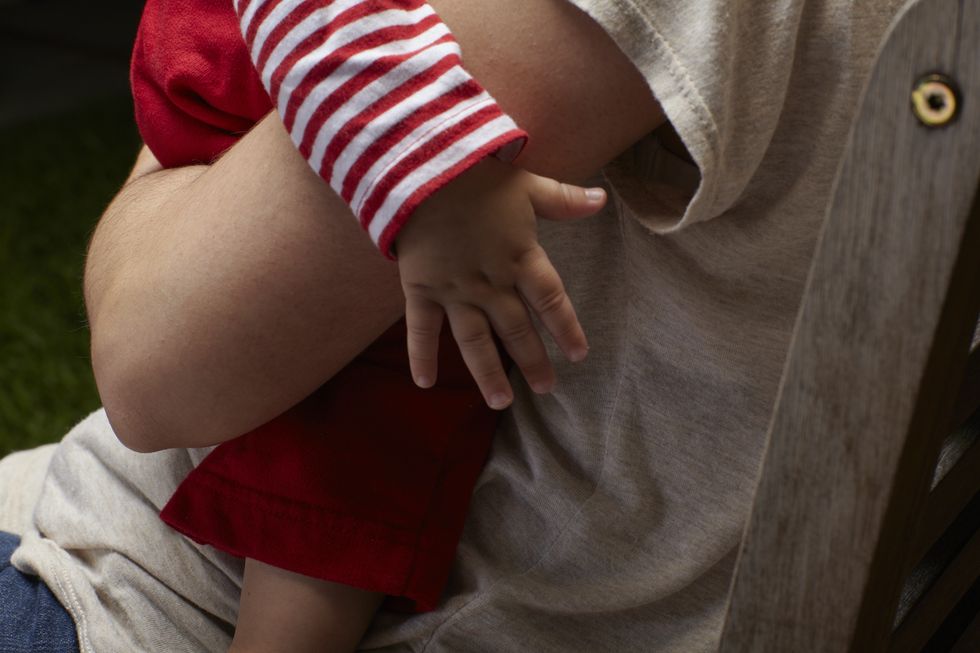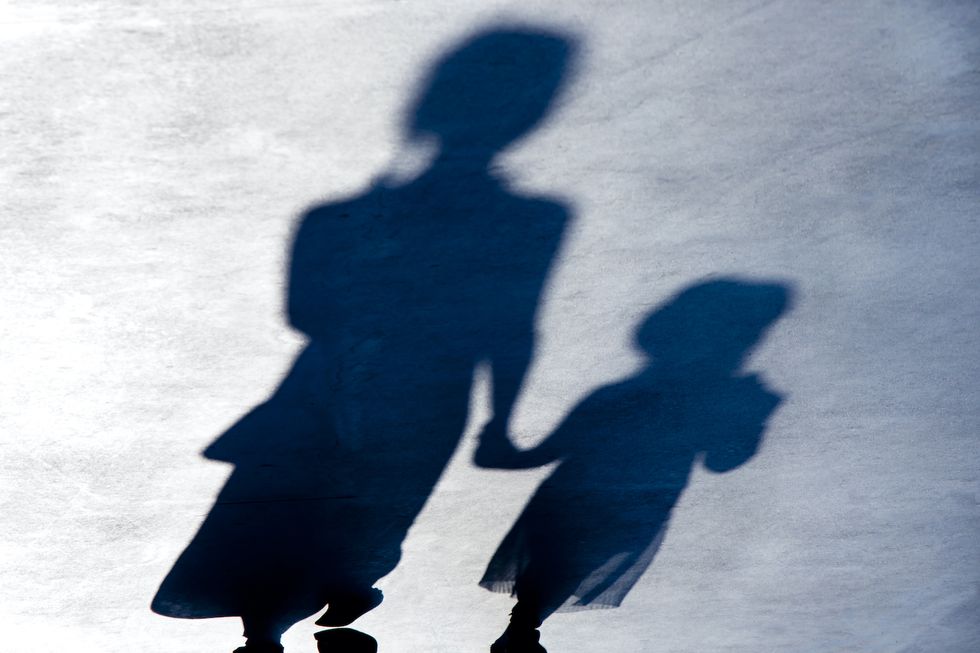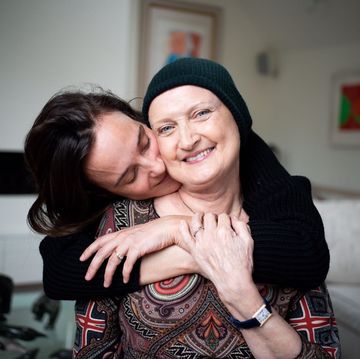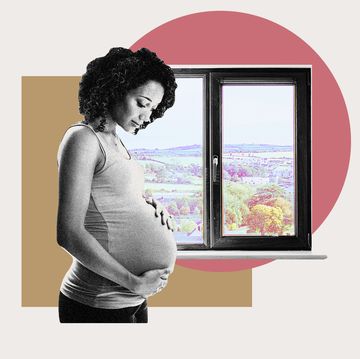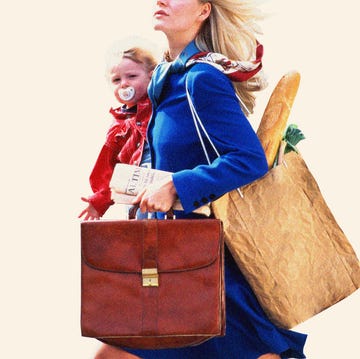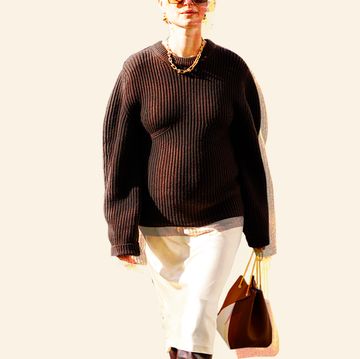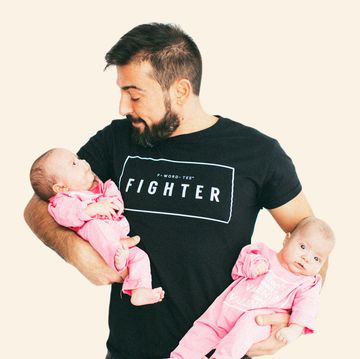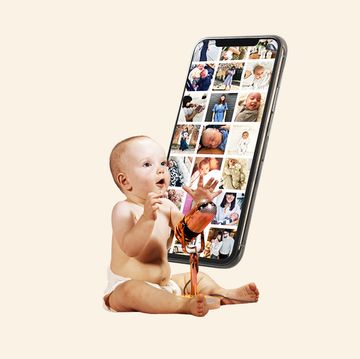‘Do you want kids?’
You’ll likely be asked this at least once in your lifetime. Especially if you're a woman. I was confronted with the question for the first time last summer. Deep in conversation with another journalist, as we reeled off our plans for the year ahead – friends’ weddings, holidays abroad, staycations – we soon got onto the topic of relationships. He posed the question with the nonchalance of someone wondering if I take milk in my tea. ‘Yes,’ I immediately replied before pausing. ‘But I don’t know why.’
I haven’t always been so ambivalent about motherhood. In fact, quite the opposite. You’d rarely see me as a child without a BABY Born aggressively strapped into a Toys ‘R’ Us pram. In my teens, my homework diary was littered with the scribblings of baby names; heavily influenced by Noughties celebrities. My twenties, meanwhile, were punctuated by the click of foil breaking on my contraceptive pill packet – a comforting daily reminder that pregnancy is an experience I will one day (hopefully) choose. But now, in my thirties, I’ve increasingly started to question how I’ll know when I’m 'ready' for kids, if I can't even explain why I want them in the first place?
FIND OUT MORE ON ELLE COLLECTIVE
Recent figures from the Office for National Statistics show that fewer women under 30 are having babies than ever before. The only age group in which births are increasing is the over-40s. There are so many reasons why women might be choosing to delay motherhood – job stability, levels of education and income, medical advancements in fertility and widely accepted understandings of what it means to be a mother in the 21st Century all included. Earlier this week, Lily Allen has provoked debate among women (largely) when she joked that her children 'ruined' her career. 'I love them and they complete me, but in terms of popstardom, they totally ruined it,' she told the Radio Times podcast. 'I get really annoyed when people say you can have it all because, quite frankly, you can't.' For Motherhood Clarity Therapist Ann Davidman, it’s not so much the delay in motherhood that’s keeping her busy, rather people trying to figure out if they really should have children at all.
Davidman has been helping people figure out whether they want kids for over 30 years. In 1991, she and her colleague Denise Carlini (at that time, in their thirties), created a group to help women understand their parenthood choices better, and in 2016 co-wrote the book Motherhood - Is It For Me? to provide a structure for that process. Despite originally wanting to be a parent herself, following the death of her husband and failed attempts at becoming pregnant using his frozen sperm, Davidman ultimately decided to pursue a childfree life. ‘I was totally fine with it at that point, though grieved that it wasn't going to be,’ she says.
Now, she’s focussed on chipping away at the discomfort and prejudice surrounding parenthood ambivalence, and helping individuals make informed decisions about whether to become a parent or not. While she works with both men and women, the licensed marriage and family therapist believes women are hit ‘much harder with pronatalism’ (i.e. people encouraging you to have children) than their male counterparts. ‘It'd be so amazing to live in a post-pronatalist society where children are raised with the message that not everybody becomes a parent and that you should decide for yourself if it's something you want to do.’
According to Davidman, there are various reasons clients seek her help: some question their desire to have children due to conscious learnings from family, concerns over hereditary illnesses, the societal pressure to procreate, the climate crisis and their finances. Others may want to become a parent, but are fearful of childbirth, are unsure whether they should pursue adoption and fostering, or are worried that if they ignore the tick of the biological clock, it’ll be too late.
Regardless of the reasons, Davidman says that rather than focussing on the decision you feel you need to make, it's important to first consider what you really want.
Here are Davidman’s seven pieces of advice to help you decide whether or not you want children:
1. Accept that it's okay to not know whether you want kids
One of the biggest issues when it comes to motherhood ambivalence is the assumption that it’s somehow wrong to not know. ‘The most invisible population of men and women are those who don’t know if they want children,’ says Davidman. ‘It’s as if there’s no room to explore the question. You’re made to believe you’re supposed to know and if you don’t know, then you shouldn’t have kids or that there’s something wrong with you. It’s rational to not know and there's actually an advantage to this because it forces you to stop in your tracks and really think about what you want.’
To explain it best, Davidman uses the analogy of being lost in a car at an intersection and not knowing which way to go. ‘You’re not going to figure it out while you’re sat at the crossroads,’ she says. ‘The best thing you can do is take a step back, breathe, accept it’s okay to be lost and decide not to know the way on purpose, instead of trying to figure out the "right" way to go. You need internal spaciousness. If you're anxious and fearful, you're not going to make good decisions.'
For Davidman, questioning the idea of parenthood isn't just for those sitting on the fence, either. ‘There are plenty of people who say they’ve always known they wanted to become a mother, but perhaps they haven’t explored anything else or didn’t give themselves permission to explore that belief. People who openly talk about being ambivalent about motherhood often trigger other people's ambivalence that’s unexplored,’ she says.
‘Even if you think you know if you want children, that belief also deserves exploration, so that you can understand where your certainty is coming from, not because you owe someone else an explanation, but yourself. There is never a risk in exploring a truth because if something is true, it will remain true,’ she adds.
2. There is no right or wrong decision
When it comes to choosing whether or not to have children, one common concern Davidman encounters is fear of ‘wrong’ decision. But she says it’s important to first understand that there is no right or wrong choice.
‘The people who reach out to me have usually been struggling with their feelings around parenthood for some time, and are commonly awake at 1am in the morning, searching the internet for help,’ she says. ‘Most of them are stuck in wanting to make the right decision, as if there is a right decision, or not wanting to regret their choice. Ultimately, they don't want to feel broken and a lot of them are tortured. I don't think there's a good, bad, right or wrong decision – there's what's right for you. The people who come to me arrive with their own set of beliefs that they’ve heard or bought into, through no fault of their own.
Meditation instructor Dena Argyropoulou, 43, sought Davidman’s help last year after growing up in a family who instilled the belief that motherhood was ‘something women simply did’, and was ‘attached to their self-worth and value as humans’. During her youth Argyropoulou tells me that she believed that a woman must have children ('ideally more than one'), a child-free life would be full of misery and regret, and that life is incomplete without the joy children bring. ‘I adopted these beliefs as my own from an early age, however they were never something I truly believed in or identified with,’ she says.
Argyropoulou sought Davidman's help because that she worried she'd regret having or not having children. ‘I was a people pleaser and having done many things in the past to fulfil certain cultural expectations… I wanted to find the courage to make my own decision. My fear was that I’d give in to the expectations without truly wanting to have a child.'
3. Become ambivalent on purpose
When you’re at the middle of a crossroads in life, confusion is like mud – it prevents you from moving on to find a solution to your problems. ‘I help people move away from their torture, calm down their nervous system, and quiet the noise in their head so that they can approach this topic from a grounded place of having permission to not know on purpose,’ says Davidman. ‘I ask people to choose not to know on purpose, because then it puts them in the most open place to receive new information. You can rehash what you know, over and over again, but if you’re in an open place then you can receive new information about how you've been viewing parenthood. Actively choosing not to know doesn’t mean that you're passive. This is a decision that’s happening to you, so you're positively choosing to address the situation, as it stands.’
It's a process Kayla Scott, 32, a nanny of three and a marriage and family therapist experienced after seeking Davidman’s guidance last June. As a child, Scott says she knew she wanted to have children (‘I didn't know there really was an option to choose otherwise’), but that as she got older she resented the caregiving role mothers seemingly adopted. ‘I feared I'd disappear if I became a mother one day; as though my personhood would no longer seem all that important to others around me, as if I'd blend into the background and that felt scary,’ she says.
‘I hoped one day I would "just know" as it seemed others in my life did and my husband, similar to others in my life, assumed I'd come around to the idea and eventually want to be a mother… Prior to taking Ann's course, I felt paralysed in the decision making process. I had many fears that felt all consuming with few people who understood.’
During Davidman’s course, which often involves guided visualisations, group meetings, journalist prompts, Scott says her group were asked to intentionally spend weeks choosing not to make a decision about motherhood and getting in tune with her desires. ‘Taking a brief reprieve from trying to make a decision about kids was such a relief!’
4. Don’t draw conclusions
You’d be forgiven for thinking that if you don’t feel broody on seeing a mother and baby on the bus, or a woman setting eyes on their newborn for the first time that it somehow indicates you shouldn't be a mother. But according to Davidman, reactions to certain situations involving children don’t help inform your decision to parent or not.
‘The answer is not outside of you, nor your reaction to holding a baby, being around children, babies or hanging out with young people,’ she says. ‘There are plenty of people who adore children, but don't want to raise them, or have a hard time with kids, but really want to become a parent. We shouldn’t draw conclusions from experiences of being around children to inform our decision because it’s more complicated than that.
‘During my course we go through exercises where the individual spends some time assuming they have decided to become a mother, and not become a mother. Everyone does this naturally, but people often think that if their reaction to being told "they’re going to live a childfree life" is heartbreak, then that must mean they want children. However, that would be a false conclusion because it should tell them that there’s something there to look explore deeper.'
5. Remember that your fears are irrelevant
If you’re terrified of heights and standing on the verge of a cliff, someone telling you that your fears mean nothing might push you over the edge (metaphorically speaking). But according to Davidman, when it comes to gaining clarity on whether you should or shouldn’t have children, you need to try to block them out of your mind.
‘Everybody has their fears but the priority is to identify what they are and then put them to the side,’ she suggests. ‘When people come to me with their fears and concerns – whether it’s that they’re single, fear pregnancy or want to be a mother to a child from the age of four and up only - we don't actually talk about them at all. Fears get in the way of a person figuring out what they desire, so if they keep focusing on trying to resolve their fears, they don’t get any closer to that clarity.’
Davidman adds that many women admit to being scared that a decision about motherhood will be made for them, because they’ll have waited too long and it won’t physically be possible to have biological children. However, others are fearful of the regret they’ll feel over their decision, whatever they choose to do.
‘I felt the pressure of ageing, but I also never felt a deep desire to have children,’ says Argyropoulou. ‘I wanted to find out if I could untangle the confusion and fear I felt about becoming a mother and find answers to my questions like: “Is there something wrong with me because I don’t feel motherly or excited over having a child?” and “I don’t want to live with this anguish anymore, will I find peace of mind?”
6. Deciding to become a parent is an individual experience
The most important relationship you have in the decision-making process is with yourself. Regardless of whether you're in a relationship, entering into parenthood is singular choice that should not be affected by another person’s desires.
‘Figuring out whether you want to become a parent is an individual issue, not a couple’s issue,’ outlines Davidman. ‘If a couple reaches out to me, I let them know that they can talk about this issue forever, but the most efficient way to work their confusion is for each person to do their own work on what they want. What you want has nothing to do with your partner, if you have one. Once you have better clarity about your own thinking, you can then talk about what decision you're going to make together.’
Despite Davidman’s qualification as a therapist, neither therapy nor discussions about the pros and cons of parenting factor into her course. Instead, it's all about decision making. ‘We focus on activating your unconscious and subconscious – there's very little that's discussed about parenting, because it's really a course about helping you understand if you have healthy boundaries or not. If you have unhealthy boundaries, it's hard to make decisions because you're always thinking about someone else and not yourself. Some people are raised in an environment where they weren't considered in the way they needed to be, so they don't even know how to consider themselves first. By the time the course has ended, an individual might not have made a decision about becoming a parent, but they are clear on what they want. They will also know the next steps to take, now they’re easier to navigate.
Argyropoulou has said that she’s now reached a place where she feels empowered to challenge the deeply rooted beliefs she’s adopted about motherhood, and the clarity to make the distinction about whether she wants to become a parent. ‘I’m sad I had to suffer this long with indecision,’ she admits. ‘I forgive myself and the loving women in my family because my [previous view of motherhood] wasn’t their fault either (thanks to the patriarchy and organised Greek Orthodox religion).’
7. Disassociate desire from decision
Davidman thinks you need clarity of your desire. The ‘why’ is more important than the ‘how’ during this process.
‘If you ask someone “what do you want?” some people will rattle off all the things they want or feel entitled to think they should want,’ explains Davidman. ‘Others won’t know how to answer the question at all, and some will only want what they know is attainable. But you need to understand that you get to want what you want.
An individual might be raised in an environment where the message is to procreate and so they think they’re supposed to want that, and believe people want that of them. But inside they might be questioning what they truly want and the consequences of living out that desire. Desire is about focusing on internally what you want.
‘Decision making, however, looks at conditions. For example, what do you need help with in order to make a desire come to fruition? If you want to be a parent but your partner doesn’t, or vice versa, then you’ll have to make a decision about your relationship to fulfil your desire. If you want to be a parent once you’re financially secure, then you need to figure out how to make that a possibility. When you're making a decision, it's so much easier to think about all the details and conditions when you're coming from a clearer place and what you want.’
After working with Davidman, Scott admits the biggest shift in her mindset about motherhood is that ‘it's not one size fits all and that your desire does not need to match your decision’.
‘I don't necessarily desire to be a mother, however I'm neutral in that I'm open to joining my husband in parenthood and creating a way of life that works for both of us and where we prioritise remaining connected to ourselves as to not lose either of us to parenting,’ she says. ‘I grew up believing no one should have a child unless they want to parent with all their being. I'm learning this can be flexible and be ok… I get to decide and define my motherhood.’
This feature was originally published in 2023 and has since been updated.
ELLE Collective is a new community of fashion, beauty and culture lovers. For access to exclusive content, events, inspiring advice from our Editors and industry experts, as well the opportunity to meet designers, thought-leaders and stylists, become a member today HERE.

Katie O'Malley is the Site Director on ELLE UK. On a daily basis you’ll find Katie managing all digital workflow, editing site, video and newsletter content, liaising with commercial and sales teams on new partnerships and deals (eg Nike, Tiffany & Co., Cartier etc), implementing new digital strategies and compiling in-depth data traffic, SEO and ecomm reports. In addition to appearing on the radio and on TV, as well as interviewing everyone from Oprah Winfrey to Rishi Sunak PM, Katie enjoys writing about lifestyle, culture, wellness, fitness, fashion, and more.


